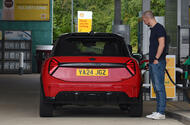European Commission Urged to Accelerate Roll-Out of E-Fuels to Avoid Backdoor Ban on Combustion Engines

Introduction
The CEO of BMW, Oliver Zipse, has criticized the European Union’s plan to ban the sale of new combustion-engined cars by 2035 and has called for the accelerated roll-out of e-fuels as an alternative solution. Zipse argues that the current approach would effectively ban combustion engines “through the back door” and proposes that the European Commission must prioritize the availability of e-fuels to make their use practical by 2035.
The Current Legislative Framework
According to the existing legislative framework, the European Union plans to prohibit the sale of new non-zero-emission cars by 2035. However, combustion engines will still be allowed if they run solely on carbon-neutral fuels like e-fuels. This exemption aims to provide an opportunity for the continued use of combustion engines while reducing their carbon emissions.
The Need for Accelerated Roll-Out of E-Fuels
Zipse emphasizes the urgency of accelerating the availability of e-fuels to avoid a de facto ban on combustion engines. He argues that the limited availability of e-fuels, caused by their production method, poses a significant obstacle to their viability. E-fuel production requires a substantial amount of energy, as it relies on “green” hydrogen produced through water electrolysis using renewable electricity.
However, the current renewable energy production in the EU is insufficient to meet the demands of e-fuel production. The International Energy Agency’s 2019 report states that producing all of today’s industrial hydrogen output from electricity would require 3600TWh of electricity. This is nearly 1000TWh more than the EU’s entire energy production in 2022, of which only 39.4% came from renewables. Therefore, Zipse suggests that this energy could be better utilized to directly power electric cars.
E-Fuels as a Viable Solution
Despite the challenges, e-fuels are considered a viable solution for decarbonizing the existing fleet of combustion-engined vehicles. They also offer an alternative for vehicles that are not suitable for battery electrification, such as sports cars and heavy goods vehicles (HGVs). Notably, Porsche has made significant investments in e-fuel production through its partnership with Highly Innovative Fuels (HIF), which operates the Haru Oni plant in Chile. Ferrari has also expressed support for carbon-neutral fuels, highlighting their importance in the development of sustainable alternatives for ICE cars.
Future Implications
Formula 1 is set to transition to carbon-neutral fuels in 2026, introducing new technical regulations to facilitate this change. This move further underscores the industry’s recognition of the potential of e-fuels in reducing carbon emissions and ensuring a sustainable future for combustion engines.

